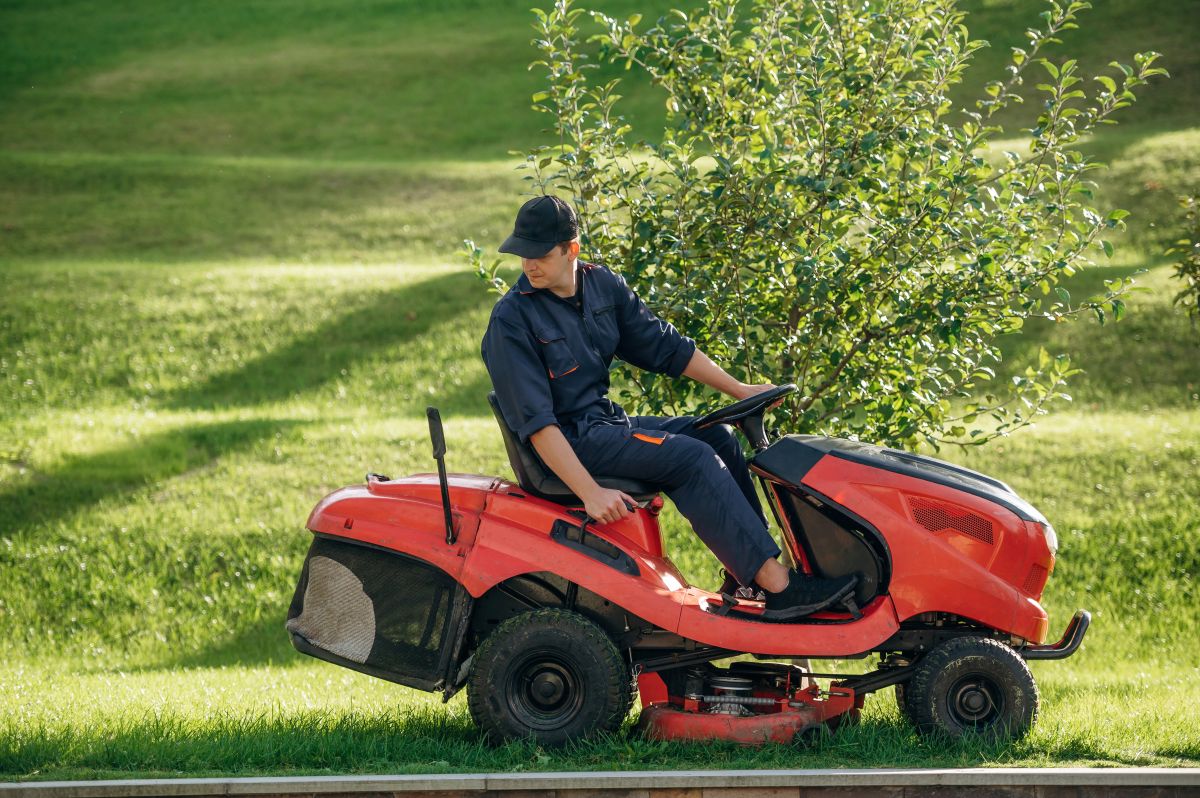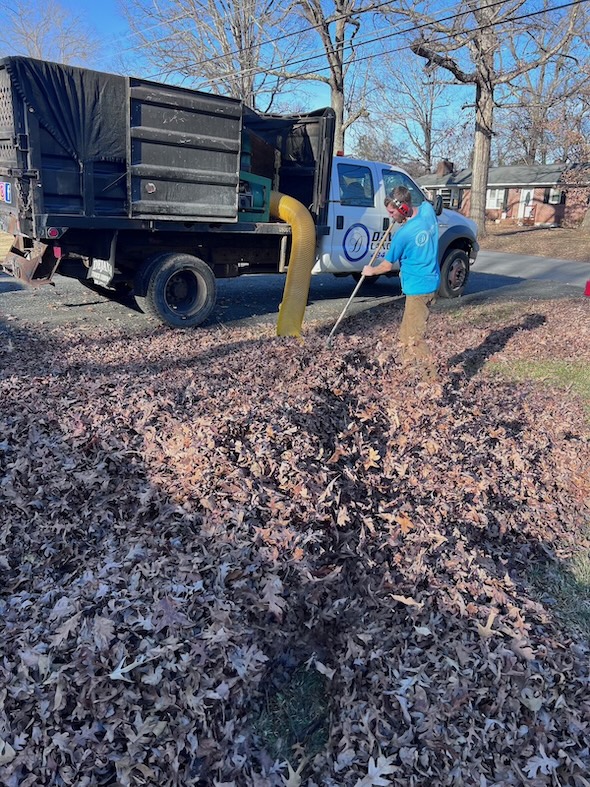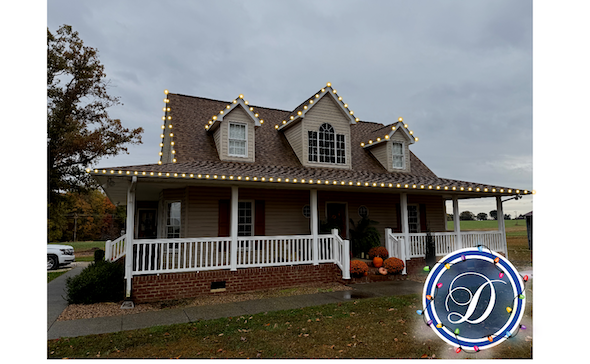I've been cutting grass professionally in Central Virginia for years, and I can tell you something that might surprise you. Most homeowners spend more money and time on DIY lawn mowing than they would pay for professional services.
Last month, I helped a client in Forest calculate his true lawn mowing costs. When we added up his mowing lawn mower purchase, maintenance, fuel, repairs, and weekend time, he was spending $2,400 per year. Our professional lawn mowing service would have cost him $1,800 and given him back 52 Saturday mornings.
This story isn't unique. I see it repeatedly across Lynchburg, Appomattox, and Concord. Homeowners think they save money by doing it themselves, but the math tells a different story.
What Professional Lawn Mowing Really Means for Your Property
Professional lawn mowing goes far beyond just cutting grass. It's a complete approach to maintaining your lawn's health, appearance, and value. When I mow a lawn, I'm thinking about grass height, growth patterns, seasonal needs, and long-term lawn health.
Most homeowners grab their mowing lawn mower and cut everything to the same height every weekend. This approach actually damages grass and creates the problems I'm called to fix later.
Professional lawn mowing services use sharp blades, proper techniques, and timing that keeps your grass healthy year-round. We adjust cutting height based on season, weather, and grass type. This attention to detail makes the difference between an okay lawn and a spectacular one.
The Hidden Problems with DIY Lawn Mowing
I visit properties where homeowners have been cutting their own grass for years, and I see the same problems repeatedly. These issues develop slowly, so many people don't realize their mowing approach is causing damage.
Dull blades tear grass instead of cutting cleanly. This creates brown tips and makes your lawn vulnerable to disease. I've seen entire lawns turn brown because the homeowner didn't sharpen blades all season.
Wrong cutting height weakens the grass. Most people cut too short because they think it means less frequent mowing. Short grass develops shallow roots and struggles during Virginia's hot summers.
Inconsistent patterns create ruts and compaction. Moving the lawn in the same direction every time creates grooves and compacts soil. Professional services rotate patterns to prevent this damage.
Poor timing stresses the grass. Cutting wet grass clumps and damages the lawn. Mowing during heat stress makes problems worse. We time our visits based on weather and growth conditions.
Why Moving Lawn Sprinklers Matters More Than You Think
Here's something most homeowners never consider: moving lawn sprinklers properly can make or break your mowing results. I've seen beautiful lawns ruined because sprinklers weren't positioned correctly during mowing.
Professional lawn mowing services coordinate with irrigation systems. We know how to work around sprinkler heads without damaging them. We also understand how sprinkler patterns affect grass growth and adjust our mowing accordingly.
Many DIY homeowners damage sprinkler heads with their mowing lawn mower, creating expensive repairs. Others leave wet spots unmowed because they can't figure out the timing. Professional services handle these challenges seamlessly.
The Real Cost of Owning a Mowing Lawn Mower
Most homeowners don't calculate the true cost of lawn mower ownership. I help clients understand these hidden expenses when they're deciding between DIY and professional lawn mowing services.
Initial purchase: Quality mowing lawn mowers cost $300-800 for walk-behind models, $2,000-5,000 for riding mowers.
Annual maintenance: Oil changes, air filters, spark plugs, blade sharpening add up to $150-300 yearly.
Repairs: Broken belts, engine problems, deck damage average $200-500 per year after the warranty expires.
Fuel costs: Gas, oil, and additives cost $100-200 annually depending on lawn size.
Storage requirements: Garage space, sheds, or storage fees have value too.
Time investment: Most homeowners spend 2-4 hours weekly during growing season.
When you add these costs over five years, professional lawn mowing services often cost less while delivering superior results.
What Separates Professional Lawn Mowing from Weekend Warriors
The difference between professional and amateur lawn mowing becomes obvious when you know what to look for. I've trained my eye to spot professional work versus DIY attempts.
Equipment quality makes a huge difference. Commercial mowing equipment cuts cleaner, handles terrain better, and works faster than consumer models. Professional mowers also have multiple cutting height adjustments for different grass types and seasons.
Blade maintenance is crucial. We sharpen blades regularly and replace them when necessary. Sharp blades create clean cuts that heal quickly and resist disease. Dull blades tear grass and leave brown, ragged edges.
Pattern variation prevents damage. Professional services change mowing patterns each visit to prevent soil compaction and rutting. We also vary the direction to encourage upright grass growth and even coverage.
Timing expertise improves results. We mow based on grass growth, not calendar schedules. During peak growing season, this might mean twice weekly. During slow periods, we adjust frequency to avoid stressing the grass.
Seasonal Lawn Mowing Strategies That Most People Miss
Virginia's climate requires different mowing approaches throughout the year. Most homeowners use the same technique year-round and wonder why their lawn struggles during certain seasons.
Spring mowing sets the foundation. Early season cuts should be shorter to remove winter damage and encourage new growth. We gradually raise cutting height as temperatures warm.
Summer mowing focuses on stress reduction. Higher cutting heights shade roots and conserve moisture during hot Virginia summers. We avoid mowing during heat waves and drought conditions.
Fall mowing prepares for winter. Gradually lowering cutting height in fall reduces snow mold and disease problems. The final cut of the season should be shorter than summer height but not scalped.
Equipment adjustments for each season. Blade sharpness becomes critical in spring when grass grows rapidly. Summer requires careful attention to avoid heat stress. Fall mowing removes leaves while cutting grass.
How Professional Lawn Mowing Services Handle Virginia's Unique Challenges
Central Virginia presents specific challenges that require local expertise. I've developed techniques specifically for our region's clay soils, humidity, and weather patterns.
Clay soil compaction is a major issue. Our heavy soils compact easily, especially when wet. Professional services know when conditions are too wet for mowing and adjust schedules accordingly.
Humidity affects grass growth patterns. Virginia's summer humidity creates rapid growth followed by stress periods. We adjust mowing frequency and height based on these cycles.
Variable spring weather requires flexibility. Virginia springs can jump from cold to hot quickly. Professional lawn mowing services adapt cutting schedules to match unpredictable growth patterns.
Disease pressure in humid conditions. Proper mowing techniques reduce disease problems common in humid climates. Clean cuts, appropriate timing, and pattern variation all help prevent fungal issues.
The Economics of Lawn Mowing Service vs. DIY
I help homeowners understand the true economics of professional lawn mowing services versus DIY approaches. The numbers often surprise people.
Time value calculation: If your time is worth $25 per hour and you spend 3 hours weekly mowing, that's $3,900 in time value during growing season. Professional services typically cost $2,000-3,000 annually.
Equipment depreciation: Mowing lawn mowers lose value quickly. A $800 mower is worth $200 after five years, representing $120 annual depreciation plus maintenance costs.
Reliability factor: Professional services show up regardless of your schedule, health, or weather. You never miss a mowing because of vacation, illness, or equipment breakdown.
Result quality: Professional results increase property value and neighborhood appeal. Poor DIY mowing can actually decrease home value and create neighborhood tensions.
Warning Signs Your Current Mowing Approach Isn't Working
I evaluate hundreds of lawns annually, and certain warning signs indicate mowing problems. Homeowners often don't recognize these issues until damage becomes severe.
Brown grass tips throughout the lawn indicate dull mower blades that tear instead of cut. This damage makes grass vulnerable to disease and creates an unkempt appearance.
Ruts and compacted soil develop from repeated mowing in the same pattern. These areas become muddy in rain and hard in dry weather, preventing healthy grass growth.
Uneven grass height creates a bumpy, unprofessional appearance. This usually results from uneven mowing speed, improper equipment adjustment, or terrain challenges.
Clumping and thatch buildup occur when grass clippings aren't handled properly. Heavy clumps smother grass underneath and create bare spots over time.
Scalped areas and missed spots indicate operator inexperience or inappropriate equipment for the terrain. These problems worsen over time without correction.
Technology and Innovation in Modern Lawn Mowing
Professional lawn mowing services use technology that most homeowners never see. These innovations improve efficiency, results, and environmental impact.
GPS tracking ensures consistent coverage and helps optimize routes for efficiency. We never miss sections or duplicate coverage unnecessarily.
Mulching technology returns nutrients to the soil while eliminating clippings disposal. Professional mulching mowers handle clippings better than consumer models.
Smart scheduling based on weather forecasts and growth rate predictions optimizes timing for best results and efficiency.
Equipment telemetry monitors mower performance and maintenance needs, ensuring consistent operation and preventing breakdowns during your service.
Environmental Benefits of Professional Lawn Mowing Services
Professional lawn mowing services often have smaller environmental impact than individual homeowners maintaining their own equipment. This might seem counterintuitive, but the math is clear.
Equipment efficiency: Commercial mowers operate more efficiently than consumer models and receive better maintenance, reducing emissions per acre mowed.
Route optimization: Professional services mow multiple properties per trip, reducing transportation emissions compared to individual homeowners driving to purchase gas and supplies.
Proper disposal: Professional services handle grass clippings, used oil, and equipment disposal responsibly through established recycling programs.
Reduced chemical usage: Proper mowing height and technique reduce need for fertilizers and pesticides by promoting natural grass health.
Choosing the Right Lawn Mowing Service Near You
Not all lawn mowing services deliver the same quality or value. I recommend evaluating several factors when choosing professional lawn mowing near me.
Local experience matters. Services familiar with Virginia grass types, climate, and soil conditions deliver better results than generic providers.
Equipment quality affects results. Ask about mower types, maintenance schedules, and blade sharpening frequency.
Insurance and licensing protect you. Verify that potential services carry liability insurance and proper business licenses.
Communication and reliability determine your satisfaction with the service relationship. Look for services that communicate schedules, weather delays, and any issues clearly.
Integrated services can provide better value if you need additional lawn care beyond basic mowing.
Making the Decision: Professional Service vs. DIY
After years of helping Central Virginia homeowners with their lawn care, I understand the factors that make professional lawn mowing services worthwhile for most people.
Time freedom is the biggest benefit most clients mention. Getting back weekend mornings for family time, hobbies, or relaxation has real value that's hard to quantify.
Consistent results eliminate the stress of wondering whether your lawn looks good. Professional services deliver predictable, high-quality results every visit.
Equipment worries disappear. No more shopping for parts, dealing with repairs, or storing equipment. Professional services handle all equipment-related headaches.
Seasonal flexibility means your lawn gets proper care regardless of your schedule, health, or travel plans.
The decision ultimately comes down to your priorities, budget, and how you value your time. For most Central Virginia homeowners, professional lawn mowing services provide better value than DIY approaches.
Your lawn is one of the first things people notice about your property. It affects curb appeal, property value, and your enjoyment of outdoor spaces. Professional maintenance ensures your lawn always looks its best while freeing you to focus on what matters most to you.
Ready to reclaim your weekends and get a professionally maintained lawn? Contact Davidson Landscaping for expert lawn mowing services throughout Central Virginia. We serve Lynchburg, Appomattox, Forest, Concord, and surrounding areas with reliable, professional lawn care. Call (434) 609-1696 or get your free estimate today.
Frequently Asked Questions
How often should I have professional lawn mowing service?
Most Virginia lawns need weekly mowing during peak growing season (April-October) and bi-weekly during slower periods. We adjust frequency based on grass growth and weather conditions.
What's included in professional lawn mowing services?
Basic service includes mowing, edging, trimming, and cleanup. Many services also include moving lawn sprinklers, pattern variation, and seasonal height adjustments for optimal grass health.
How much do lawn mowing services cost near me in Central Virginia?
Professional lawn mowing typically costs $35-75 per visit depending on lawn size and complexity. Annual contracts often provide better value than per-visit pricing.
Do I need to be home for lawn mowing service?
No, most professional services work while you're away. We coordinate access, handle moving lawn sprinklers if needed, and communicate any issues or schedule changes via text or email.





